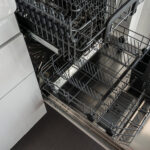Dishwasher Types: Benefits, Drawbacks & Considerations

Photo credit: Castorly Stock
Dishwashers are an indispensable kitchen appliance that simplifies our daily chores. With advancements in technology, a wide variety of dishwashers have emerged, each offering unique features and functionalities to cater to diverse needs. Explore various types of dishwashers, their pros, cons, and essential considerations to help you make an informed decision when choosing the perfect dishwasher for your home.
Built-In Dishwashers
Built-in dishwashers are the most common type found in modern households. These units are seamlessly integrated into the kitchen cabinetry, providing a sleek and cohesive appearance. Their primary advantage lies in their quiet operation and spacious capacity, accommodating larger loads. Built-in dishwashers are available in various configurations, including standard, tall tub, and compact, catering to different kitchen layouts. One potential downside is their installation complexity, as it requires professional setup and may not be suitable for renters or those with limited space.
Drawer Dishwashers
Drawer dishwashers, also known as dishwashing drawers, offer a space-saving solution for smaller kitchens or households with limited dishwashing needs. These units feature separate drawers, allowing you to run one or both drawers independently, which can save water and energy for smaller loads. The ergonomic design makes loading and unloading dishes effortless, while the shallow depth enhances accessibility. However, drawer dishwashers tend to be pricier than their conventional counterparts, and the limited capacity might not be suitable for larger families or frequent entertainers.
Smart Dishwashers
With the rise of smart home technology, smart dishwashers have entered the market, revolutionizing how we interact with household appliances. These dishwashers can be controlled remotely through smartphone apps, enabling users to monitor cycles, receive notifications, and even reorder dishwasher detergent automatically. They often come with innovative features like soil sensors, which optimize water usage, and voice-activated controls for added convenience. However, the initial cost of a smart dishwasher may be higher, and reliance on technology could result in occasional connectivity issues.
Portable Dishwashers
Ideal for renters or those with inadequate cabinet space, portable dishwashers are freestanding units on wheels that can be easily moved and connected to the kitchen sink. Their mobility offers flexibility, enabling users to take the dishwasher with them when moving houses. These dishwashers are cost-effective and require no permanent installation. Nevertheless, their capacity is generally smaller, and the wheels might not be as sturdy, potentially leading to stability issues.
Countertop Dishwashers
Compact and budget-friendly, countertop dishwashers sit conveniently on the kitchen counter, requiring minimal space. These are a type of portable dishwasher, but they sit on the countertop. They are suitable for singles, couples, or small families with light dishwashing needs. Countertop dishwashers offer easy setup and can be connected to the faucet directly. While they are energy-efficient and easy to store when not in use, they might not accommodate larger or oddly shaped dishes, and their cleaning capacity is much more limited compared to larger dishwasher models.
Choosing the right dishwasher for your home involves considering various factors, such as available space, budget, family size, and desired features. Each type of dishwasher offers distinct advantages and drawbacks, catering to different lifestyles and needs.
Whether you opt for a built-in dishwasher for seamless integration or a portable unit for flexibility, understanding each option will help ensure that your kitchen is equipped with the perfect dishwasher to suit your lifestyle.
View other home appliance guides from Dwell Adore, including our blender guide and washing machine guide.









